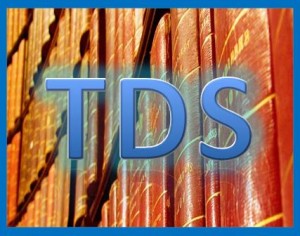No disallowance for non-deduction of TDS if the receiver has paid income tax on the same
 The Hon’ble Income Tax Appellate Tribunal, Agra Bench (Agra) in the case of Rajeev Kumar Agarwal vs. Additional Commissioner of Income Tax (ITA No. 337/Agra/2013) by a judgment dated 29.5.2013 held that no disallowance for non-deduction of TDS in case the recipient has paid income tax on the same.
The Hon’ble Income Tax Appellate Tribunal, Agra Bench (Agra) in the case of Rajeev Kumar Agarwal vs. Additional Commissioner of Income Tax (ITA No. 337/Agra/2013) by a judgment dated 29.5.2013 held that no disallowance for non-deduction of TDS in case the recipient has paid income tax on the same.
The Bench consisting of Bhavnesh Saini, Judicial Member, and Pramod Kumar, AM, held that the second proviso to Section 40(a) (ia) is retrospective in nature.
Brief facts of the case:
The Assessing Officer disallowed payment of interest made without deducting TDS amounting to Rs. 5, 01,872 under section 40(a) (ia) of the Act. During the scrutiny assessment proceedings, the Assessing Officer observed that the assessee made interest payments amounting to Rs. 5, 01,872, without following his tax withholding obligations as per section 194A.
The Assessing Officer noted that the scope of section 40(a)(ia) restricting deduction where sums regarding tax withholding liability has not been discharged, and disallowed Rs. 5,01,872 under section 40(a)(ia) of the Act. Being dissatisfied by the order the assessee filed an appeal before the CIT (A).
The assessee, argued before the CIT(A) that as per the insertion made by the Finance Act, 2012 and considering the fact that the recipient of interest has included the income in their filed returns of income tax and has already paid tax, as such disallowance cannot be invoked in this case.
The learned CIT (A) rejected this plea of the assessee stating that the amendment cannot be held to have retrospective effect. The disallowance was confirmed by the CIT (A). The assessee lost the case filed before the CIT (A) and being aggrieved by the order, the assesee preferred an appeal before the Hon’ble Tribunal at Agra.
Arguments of both sides:
The appeal was preferred to raise the question regarding correctness of the order dated 2.9.2013 of the learned Commissioner (Appeals), regarding the assessment under section 143(3) of the Income Tax Act, 1961 upholding the disallowance amounting to Rs 5,01,872 under section 40(a)(ia) of the Act.
The assessee contended that the object of the amendment made was that though the assessee has not deducted TDS but there has been no loss to the Revenue, as such the disallowance under Section 40(a) (ia) should not be invoked.
The Tribunal referred the judgment of the Special Bench of the Tribunal in the case of Bharti Shipyard Ltd vs. DCIT (141 TTJ 129), and that of the Hon’ble Delhi High Court in case of Rajinder Kumar wherein it was held that any amendment of a provision which is aimed at removing unintended consequences with the intention to make the provisions operative should be treated as retrospective no matter whether the same has been given effect prospectively.
The judgment:
The Tribunal carefully interpreted the legislative amendment of section 40(a) (ia), as per the Finance Act 2012. Second proviso to Section 40(a) (ia), introduced with effect from 1.4.13 provides that if an assessee fails to deduct TDS according to the provisions of Chapter XVII-B on any such sum but is not an assessee in default under the first proviso of section 201(1), then, it shall be considered that the assessee has deducted and paid the tax on such sum on the date of filing the return of income by the resident.
It can be stated that till the assessee is not an assessee in default, the disallowance under section 40(a) (ia) cannot be invoked.
It was held that by the amendment as per the Finance Act, 2012 the legislature has expressed its view to decline from deduction for expenditure in connection with payments made on which TDS has not been deducted but has not resulted in any loss to the Revenue was never the intended consequence.
It was declared that the consequences of these amendments is that the disallowance under section 40(a) (ia) cannot be invoked where even if the assessee has not deducted tax at source from the payments for expenses but the recipient has taken them into account while calculating his income and has paid due taxes, if any, and has filed his income tax return under section 139(1).
The Tribunal held that in the circumstances, the proviso shall apply retrospectively. The appeal was allowed.


 ITAT Amritsar: No Section 269SS Violation for One-Time Cash Payment Before Sub-Registrar
ITAT Amritsar: No Section 269SS Violation for One-Time Cash Payment Before Sub-Registrar  Tax Officials Unleash Digital Dragnet: How New Raid Powers Redefine Privacy, Property Rights in India and likely to Fuel Corruption
Tax Officials Unleash Digital Dragnet: How New Raid Powers Redefine Privacy, Property Rights in India and likely to Fuel Corruption  Income Tax Department Rewards for Reporting Tax Evasion: A Comprehensive Guide
Income Tax Department Rewards for Reporting Tax Evasion: A Comprehensive Guide  Forfeiture of Gratuity by Employer- What are the Remedies for an employee- Can employer be challenged?
Forfeiture of Gratuity by Employer- What are the Remedies for an employee- Can employer be challenged?  Employer can forfeit gratuity of an employee in case of moral turpitude
Employer can forfeit gratuity of an employee in case of moral turpitude  Diving Deeper: The Impact of the New Tax Bill on Dairy and Farming Income
Diving Deeper: The Impact of the New Tax Bill on Dairy and Farming Income